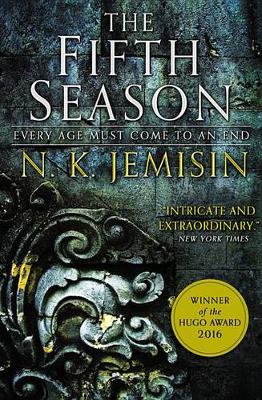Reviewed by celinenyx on
The world knows five seasons: winter, spring, summer, fall, and death. Comms are always prepared for the inevitable fifth season, where the sky darkens and life is uncertain. Told from three perspectives, this novel reveals a world where the earth itself has become angry. It shudders and heaves, and it is only orogenes that can still it. Yet they are feared and ostracized, often killed before they reach puberty. Their awful power can kill thousands of people with one thought, but is at the same time essential for humanity’s survival.
The Fifth Season contains many elements which are brought together skilfully by Ms Jemisin. Points of view span different times and places but never become confusing; little seeds promising future events fully come to bloom later on; the world feels fresh and interesting and there is always more to discover beyond the next turn. The earth as envisioned in The Fifth Season feels familiar quickly, but our understanding of its workings deepens as our protagonists discover more about it. What I especially liked is that it stays clear of the magic-apprentice trope: a typical fantasy plot where we are introduced to the magic system and the character’s surroundings through an exceedingly naïve and sheltered child. Ms Jemisin’s characters are generally already familiar with orogeny (a form of earth-moving magic), leaving space for more interesting developments.
Perhaps my favourite element of The Fifth Season is its acknowledgement that human nature is not simple. We do not all want the same thing, no matter in what groups or communities we collect ourselves. This same courtesy is extended to the other races in this universe, such as the mysterious stone-eaters. Everyone has their own agenda, and it is not always clear what it is. Additionally, the book lightly touches on non-monogamous and non-heterosexual relationships in a way that is accepting and loving. Even though romance is of little consequence as a whole within the book, it was great to see it being handled respectfully. All too often the sexually unconventional are demonized in fantasy.
A common thread throughout the novel is a commentary on race and Othering. To give a quick summary, theories around Othering try to explain how groups of people can be made to seem inhuman, not one of us, the Other. Throughout history, racial difference has often been used to treat groups of people horribly, a rhetoric employed to justify acts up to and including genocides. In The Fifth Season the racial Other is displaced unto the magical/powerful Other. It is not skin colour that sets people in this world apart (what we now would see as blackness or a mid-African phenotype is a point of beauty) but what they can do. While the characters face terrible injustices because of their capabilities, the reader feels that their powers are actually amazing and should be cherished. This emotion reaction of pushing back against discrimination of orogenes subtly points back to racial Othering. However, because that anxiety and tension is displaced onto a category of people which does not exist in our reality, it allows all people who feel like they have ever been excluded from society to identify with the plights of these characters. This is truly very well done – I can’t imagine it being handled more skilfully by any other writer.
Perhaps the only element that was missing for me was an emotional connection with the characters. A tighter connection would have catapulted this book from “wow, this is great!” to an all-time favourite. As it stands, The Fifth Season was everything I was looking for when I asked for diverse fantasy recommendations, and I can’t wait to read the rest of the series.
---
Trigger warnings: physical abuse of children, discrimination, implied genocide, forced sexual relations*, off-page execution of children, forced captivity, inter-species cannibalism.
* Regarding the forced sexual relation, it was surprisingly low in rape triggers. The female character is an active participant, seeing it more like a chore that needs to be done with low emotional repercussions.
Reading updates
- Started reading
- 22 March, 2018: Finished reading
- 22 March, 2018: Reviewed
